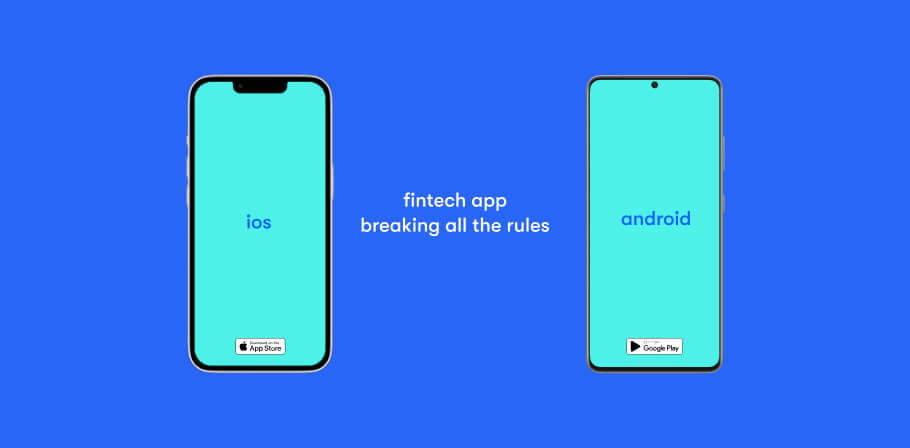Large-scale companies often rely on technological solutions to optimize and automate their workflows, achieving maximum efficiency. This is usually done by developing enterprise mobile applications. Applying these solutions helps businesses to save time and money.
Research shows that enterprise software spending reached $755 billion in 2022. The number keeps growing each year as more companies adopt new software solutions. However, this isn’t a simple task. It requires extensive planning to build a scalable, secure, and flexible application. Enterprises are expected to follow multiple regulations, often setting great challenges for developers.
Read on to discover the benefits, features, and stages of developing a successful mobile application.

What is Enterprise Mobile Application Development?
An enterprise mobile application is a software solution created specifically for an individual organization. Its goals usually enable improving the company’s existing workflow and helping employees carry out their duties more effectively. These apps are designed to be used only within a certain organization.
Mobile enterprise application development is different from startups and SMBs. As the software puts millions of dollars at stake, it covers the following aspects:
- Scalability. Businesses are expected to grow, so the app’s architecture should handle growth.
- Flexibility. The app’s architecture should support new modules and complex integrations to adapt to possible business needs.
- Security. Software must follow the company’s high-level security standards and regulations to prevent data leaks and other issues.
Additionally, the enterprise must follow Play Market and the App Store’s review guidelines to distribute its software. This requires a lot of attention from all sides: technical, legal, and usability. The slightest mistake may lead to the loss of millions of dollars, so it’s necessary to minimize the chance of error.
Types of Enterprise Mobile Applications
You must know what types of software exist before building enterprise mobile applications. They cover different business processes, so it’s necessary to understand them before developing a solution.
Management Software
Management software is one of the most important categories because it covers nearly all business aspects. Some examples are:
- ERP (Enterprise Resource Planning) apps — used to integrate all business elements in one place.
- HR management apps — used to automate manual tasks, store employee information, and create data-driven reports.
- Business management apps — used to automate, support, and optimize processes.
All these solutions are used by global companies like Nestle, Bosch, and others.
Team Collaboration Software
Team collaboration and communication software is very popular — you’ve definitely heard of Slack or Asana. These are prominent examples of this type.
Some other subcategories are:
- CRM (Customer Relationship Management) apps — used to analyze, manage, and communicate with customers.
- CMS (Content Management System) apps — used to create, edit, and publish content for the enterprise’s social media and websites.
CRM and CMS platforms are frequently used in all kinds of businesses, from small companies to large-scale organizations.
Marketing Automation Software
Marketing automation software helps companies manage their sales funnels, launch advertising campaigns, investigate leads, and create detailed reports for analysis. The application is mostly required to speed up monotonous processes and keep everything in one place.
Billing Systems
Billing systems are a frequent request in banking mobile app development. They are used to automate invoicing, payments, dunning, and anything the company might need. The software is often integrated with third-party payment gateways and in-house CRM or ERP platforms.
Messaging Software
Messaging software is among the leading communication tools. Companies often integrate audio and video conferencing, calendars, file sharing, and other features to facilitate team collaboration. This is done to create a tool that meets all the business needs and complies with security regulations.
Customer Support Software
Customer support software involves call and message routing, satisfaction ratings, self-service portals, customer management, and dozens of other features. It is required to help your team provide a top-level service that keeps all clients satisfied.
Enterprise Application Integration (EAI)
Large-scale corporations typically have their own set of tools for each task. There should be a framework that works as an automated integration solution to link each tool. This helps teams get an all-in-one app that keeps data flowing between applications.
LOOKING FORWARD TO DEVELOPING ONE OF THESE APPS?
EPAM Startups & SMBs has all the expertise you need and will help you bring your idea to life.
5 Benefits of Enterprise Mobile App Development
Apart from increasing revenue and productivity, enterprise mobile app development can bring multiple benefits to your company. The following points are the most frequent pros.
1. Managed Accounting
You can create an enterprise mobile app dedicated entirely to accounting. This means that your accountants will be able to control payment deadlines, send tax notifications, manage transactions, and complete any daily activity from their smartphones. Work gets far more comfortable with this.
2. Single Source of Truth
Enterprise mobile application development usually assumes creating large-scale software with immense capabilities. Software engineers integrate various core modules and ensure all departments can work together, keeping all data in a single place. This keeps everything structured and improves efficiency.
3. Supply Chain Control
Mobile apps help businesses monitor and control supply chains, manage couriers, and analyze warehouses. The software allows responsible people to check the required information from any place and at any time, making the process fast and easy.
4. Better Onboarding
Companies often build enterprise mobile apps that include onboarding features like introductions, tone of voice, explanations regarding work and certifications, useful contacts, and other information. The benefits also work from the HRs side because this simplifies employee management.
5. Business Strategy
Eliminate paperwork and move everything to the digital space. Everyone can see the required papers from any device without having to print an additional sheet. Also, the risk of human error is minimized as marketing campaigns, payments, and many other activities become automated.
WANT TO LEVERAGE THESE BENEFITS?
Our experts will help you get the most from your enterprise software.
Aspects to Consider Before Launching a Mobile Enterprise Application Development
Launching the development process for a mobile enterprise application requires immense strategizing. You must consider all possible aspects to ensure the choice is successful.
Among the leading aspects you might want to focus on:
Development Aims
You should understand why you need a mobile app and what results it could possibly bring. There’s no need to build an app simply for your bucket list.
Development Resources
Analyze the expertise you currently have. You might have to collaborate with a third-party vendor or partner with an experienced company like EPAM Startups & SMBs.
Team Collaboration
Your enterprise’s IT department must collaborate with the software vendor to discuss requirements and make decisions. Having a robust communication process is essential.
KPI
It’s necessary to determine which results you would consider as success. The KPI must be measurable so that you can get both qualitative and quantitative data.
Developing software for enterprises and large-scale companies without considering these aspects is impossible. When you start planning, you’ll see that there are many other things to consider. That’s why you are advised to brainstorm the topic with all the members who will make decisions in the process.
Must-Have Features of an Enterprise Mobile App
If you plan to develop mobile enterprise apps, then it’s best if you get acquainted with the required features for this type of software. There are many peculiarities that make it different from your daily Play Market applications.
Security
Most companies and corporations focus on security, as the smallest data leak might lead to multiple issues. That’s why enterprise-grade software must include two-step authentication, data encryption, role management, and others. OWASP’s secure coding principles are one of the standards to follow.

User Roles
You need a robust permission system that controls each user’s access. For example, Google Docs provides the “Owner,” “Editor,” and “Viewer” roles. An enterprise application might involve more complex permission management. In some cases, setting access individually might be the best choice.
Third-Party Integrations
While you can use mobile application development services to create any software, developing every single feature as a custom solution is long and costly. That’s why the enterprise app should support integrations with the most popular tools in your industry. This improves work efficiency and maintains the software as a single source of truth.
Data Sharing
Mobile software is expected to support all kinds of data sharing capabilities, from text documentation to several-gigabyte files. Many applications have very tight limits, so your enterprise solution should either increase or remove the limitations to provide easy data exchange and a robust working experience.
Cloud Storage
Mobile app development for enterprise-grade companies often includes cloud storage. The whole idea of this: software is fast and seamless access to data, so storing information in the cloud can drastically improve your team’s work experience. Every member will feel the benefits of this feature.
Messaging
Having a built-in messaging system in your enterprise solution is beneficial because keeping everything in one place makes work far more effective. All team members are listed in a single app, you can send any file from the cloud storage immediately, and all work-related data is at arm’s length.
Push Notifications
Modern companies often have remote workers and don’t require people to work a 9 to 6 shift without breaks. This means that people can sometimes be away from their workplace, having no access to the PC version of the app’s platform. A mobile solution will keep them notified whenever anything important happens.
Offline Mode
Nobody is protected from power and Internet blackouts. Taking into account the experience of Ukrainian developers, enabling offline access to all critical data allows people to keep on working in any circumstance. This is an important step for work efficiency and comfort.
8 Stages of Mobile App Development for Enterprise
If you decide to make enterprise mobile apps, you should expect the process to follow the standard software development lifecycle. The general steps are always the same for each product. However, the details like features and technologies are what differ.

1. Planning and Research
First of all, you should understand your expectations for the solution to determine the required features. It’s essential to decide on the must-have and nice-to-have functionality to balance the development process and start with the most needed features.
You might want to conduct several surveys involving your employees to get some ideas of what’s needed most in your company. Deep research and brainstorming are other options as well. You should answer the following questions before you proceed:
- Why do you need a mobile app?
- What do you want to achieve with this solution?
- Who will use the software?
- What features should it include?
Once you answer these questions and get at least a rough plan for the development process, you can move on to the next steps.
2. Technical Assessment
Theoretical data can help, but it isn’t all you require. Your enterprise has got its own back-end systems that are unlikely to be changed in the nearest future due to high costs and requirements. That’s why you should assess whether the mobile application can work with your current resources.
If not, this might lead to a drastic increase in the required costs because of infrastructure issues. You could use cloud infrastructure from a third-party provider; however, this isn’t always a reliable option. It’s best when you have full control over your resources.
3. Prototyping
During this stage, your enterprise mobile app developers and designers work together to create wireframes and prototypes of the software. This is required to help you see what the solution looks like and develop a basic MVP to test the features.
4. UI/UX Design
UI/UX design is as important as any other stage. This determines the usability and general impression your employees would get from using the software. That’s why it’s important to conduct deep user research and test various approaches.
5. Development Process
The development process is one of the longest stages. It requires setting databases, APIs, servers, and other components for the back-end. Software engineers also implement all the necessary features, ensure they work as intended, and generally create the complete version of your app.
Startup app development services work in a similar manner. They follow the SDLC but often focus on speed to provide a ready-made application as fast as possible to save costs. Enterprise solutions usually take their time and aren’t in a hurry.
6. Quality Assurance
Depending on the chosen methodology, your QA engineers are most likely to test the software during each development stage. They hunt down bugs and errors, ensuring you get a perfectly working solution. Some other aspects of a tester’s work include testing usability, performance, and user-friendliness.
7. Deployment
Once it is ensured that your enterprise mobile app is flawless, it is deployed for usage in the company. This means that all servers are launched, and people can now try out the software in their work. In most cases, this step also involves uploading the solution to Play Market or the App Store to ensure easy access for your employees. However, some companies might distribute the app via FTP servers.
8. Maintenance and Updates
Your software and infrastructure cannot work on their own. They require constant monitoring and updates to ensure everything works efficiently and meets the growing demand. That’s why you should keep on collaborating with a development team to maintain your technological solution.
How Much Does It Cost to Build Enterprise Mobile Apps
According to various calculations and sources, the average price to develop an enterprise mobile app is anything between $200,000 and $500,000. These costs are calculated considering the following aspects:
- Peculiarity of enterprise software development (security, efficiency, compliance);
- Different hourly rates in each country;
- Team composition;
- Included features.
The more features and requirements your mobile app has, the larger the development costs. That’s why it is important to plan each step in advance to avoid burning your budget for too many nice-to-have features.
EPAM Startups & SMBs Developers’ Experience in Enterprise Mobile App Development
EPAM Startups & SMBs is a global talent platform with FAANG-level middle and senior developers that have deep experience working with enterprise-grade software. Our services can help you assemble a team with any tech stack and expertise in under 4 weeks. You can get a remote or local team as well.
EPAM Startups & SMBs has offices all around the globe: Canada, Colombia, the United States, Austria, Armenia, France, Poland, Ukraine, and dozens of other countries. That’s why we have the capability to meet any demands to support your business and find the perfect developers for your project.
Conclusion
Enterprise mobile application development is a complex process involving multiple challenges and regulations. An effective solution requires building software with modern features like top-tier security, data sharing, cloud storage, and offline access. These improve work efficiency and can save costs in the long run.
However, you still need high-level talent to create a robust enterprise solution. Only skilled developers can maintain the balance between requirements, costs, and speed. That’s what EPAM Startups & SMBs is about.
LET’S DEVELOP A MOBILE ENTERPRISE APPLICATION!
Contact EPAM Startups & SMBs today to get a free estimate and discuss your project. You’ll get expert software engineers with rich experience in your industry.
FAQ

The Editorial Team of EPAM Startups & SMBs is an international collective of tech consultants, engineering managers and communications professionals who create, review and share their insights on business technology and project success tips.
The Editorial Team of EPAM Startups & SMBs is an international collective of tech consultants, engineering managers and communications professionals who create, review and share their insights on business technology and project success tips.
Explore our Editorial Policy to learn more about our standards for content creation.
read more



















